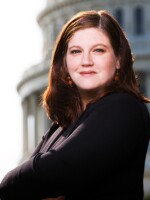Left-wing activists described the year leading up to Barack Obama's election as exhilarating, empowering and exciting.
What I wish is that President Obama had worked a little less for his ideal of bipartisanship and a little more for the people who elected him.
Now, if you ask progressives gathered for the America's Future Now conference in Washington, D.C., about the first year and a half of his presidency, they say:
"Frustrating."
"Sobering."
"Brutal."
At least, those were the reactions of, respectively, union activist Nick Weiner, University of Minnesota political science professor Dara Strolovitch, and Steve Peha, who heads an education reform consultancy.
"I had hoped for something different," Peha explains. "I had hoped for the president who ran for office, and not so much the one who's in office."
Peha says he's a pragmatist -- he knows that campaigning and governing are different. But "what I wish is that President Obama had worked a little less for his ideal of bipartisanship and a little more for the people who elected him," he says.
This is the prevailing feeling at this week's America's Future Now conference. And no one is hiding it.
"It seems like yesterday, doesn't it? Barack Obama was going to take office, he was going to change the world and we would just go home and hit the couch," liberal blogger and pundit Arianna Huffington said during the conference's very first panel of speakers.
The head of the Campaign for America's Future, which runs this conference, called the new White House an uncertain trumpet. For example, its financial reforms, he said, are too timid and too readily compromised.
And "the handling of BP has been atrocious at best," added Phaedra Ellis-Lamkins, the head of Green for All.
While trying to keep positive, speaker after speaker showed deep frustration with how things have gone so far.
The audience of about a thousand is pretty sparse compared with past years, and their conversations sound less like a movement and more like therapy.
In fact, when the audience was asked to discuss the central problem at their tables, they were told the essential question was "Is it him -- or is it us?"
Activist Marquis Jones' answer: "It's definitely us. I mean, we can't look at our elected officials and feel like it's their responsibility. We put them in office to be a representation of us, so it is our responsibility to make sure that they're fulfilling those obligations."
But Bob Kuttner, the editor of the liberal magazine American Prospect, had a different answer.
"We criticize [Timothy] Geithner; we criticize [Lawrence] Summers; we criticize [Rahm] Emanuel; we criticize the oil companies; we criticize Wall Street; we criticize everybody but Obama," he said. "Because we feel a little bit goosey about criticizing Obama."
Kuttner said progressives must hold Obama accountable. Piecemeal accomplishments are not enough, he said, to keep the movement going.
"If he doesn't do more on jobs, and on mortgage relief, and on a handful of things that affect regular people where they live, it all goes down the drain in the midterm," he said. "And then the moment is lost and the crazies take over."
That is the greatest fear of the progressives at the conference: losing completely the momentum and promise they felt just 18 months ago.
So if 2008 saw a dramatic romance between Obama and the left, it appears the honeymoon is now well over. Progressives hope that some new goals -- and a little therapy -- will hold the marriage together.
Copyright 2022 NPR. To see more, visit https://www.npr.org. 9(MDAzMjM2NDYzMDEyMzc1Njk5NjAxNzY3OQ001))






